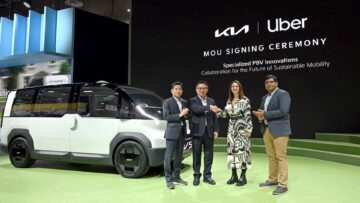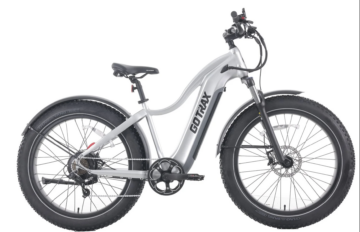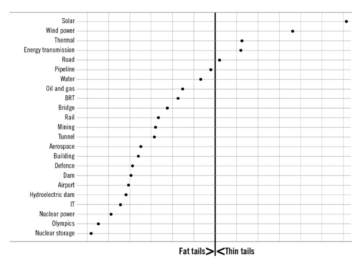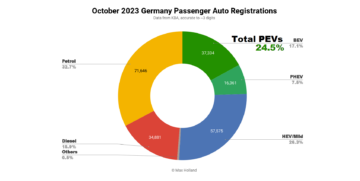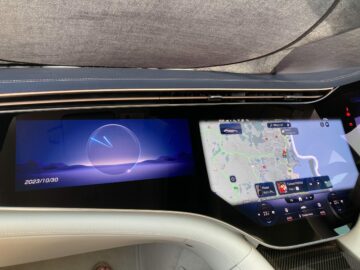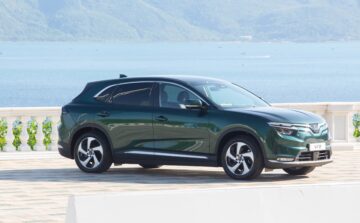Woolworths, which is popularly known as “Woolies,” has become the first South African retailer to embark on an extensive rollout of electric panel vans to deliver its customers’ online purchases. Woolies is rolling out its vehicle electrification program for its online delivery fleet in partnership with DSV and Everlectric.
This move is part of the company’s commitment to reducing its carbon footprint and promoting sustainability in the retail industry. Woolworths ran a 10-month pilot program for the electric vans in 2021. After a successful pilot project, Woolworths made a commitment to electrify its fleet.
“Last year we announced our commitment to electric delivery vehicles, and we are delighted to now have nearly half our fleet powered by the sun. The new electric vehicles have been introduced on selected routes in Cape Town and Gauteng with further rollouts and extensions into KwaZulu Natal planned to follow as soon as possible. We have bold sustainability goals and ambitions, which include the goal to have ZERO net carbon emissions by 2040, so this investment is a big step towards these goals. On an annual basis, these 41 vehicles will have the potential to save over 400,000 kg of tailpipe carbon emissions. With the exponential growth of our online business, switching to electric delivery vehicles is a smart and sustainable solution that benefits everyone,” confirms Liz Hillock, Woolworths Head of Online and Mobile.
“To power the vans, electricity will be sourced as far as possible from renewable sources by utilizing DSV’s extensive solar infrastructure at their Gauteng and Cape Town facilities. Should there be any exception to renewables recharging, DSV and Everlectric will work with an audit firm to procure Renewable Energy Certificates (RECs) to offset any indirect grid energy emissions,” explains Hillock.
“We are thrilled to be a part of this collaboration! Recognizing our role in the transport and logistics industry, we have raised our sustainability ambitions and committed to reaching net zero emissions across our operations by 2050. Achieving our sustainability goals cannot be realized alone. That’s why we work with customers and industry partners, like Woolworths and Everlectric, to develop solutions that benefit both our planet and our business,” adds Greg Saffy, Senior Director Operations, DSV Road Logistics DSV.
“We are very excited to be powering the Woolworths green logistics journey. Last year we spoke of what is possible, this year we are leading the charge in green logistics, with South Africa’s first electric vehicle commercial fleet roll out. Woolworths, along with DSV and Everlectric, have proven the viability of the solution through the proof of concept that we have run over the last two years on South African roads, under South African conditions. We are excited to now scale these learnings in our commercial solution that not only decarbonizes our clients’ fleets, but is operationally excellent and cost efficient,” says Everlectric CEO Ndia Magadagela.
Here are the specs of the electric delivery vehicle:
- The electric panel vans have a range of up to 300 km per charge.
- The Woolies online electric delivery vehicles drive an average of 150 km to 220 km per day, depending on the schedule for a particular day.
- Electric vehicles perform the same as, and mostly better than, the traditional ICE equivalents. The acceleration is better, and they generally have more torque (power), which is important for carrying heavy commercial loads.
- They have regenerative braking, which assist the electric vehicles to perform most efficiently in stop/start traffic conditions (the opposite to normal vehicles). This urban efficiency, combined with the almost 5 cubes of space and 1 ton capacity make these delivery vehicles perfect for urban logistics.
- There is “live advanced telematics” in the Woolies online electric delivery vehicles, which allow for the maximization of operational efficiencies and increased daily range, and ensures driver safety.
- This telematics has the ability to remotely limit power and speed.
- The Woolies online electric delivery vehicles are limited to a top speed of 120 km/hour.
South Africa’s grid is mostly powered by coal. It’s great to see that these vans will be powered with solar PV at the various sites. EVs and PV are a perfect combination that also helps to reduce operational costs.
Images courtesy of Woolworths
Sign up for daily news updates from CleanTechnica on email. Or follow us on Google News!
Have a tip for CleanTechnica, want to advertise, or want to suggest a guest for our CleanTech Talk podcast? Contact us here.
Former Tesla Battery Expert Leading Lyten Into New Lithium-Sulfur Battery Era — Podcast:
I don’t like paywalls. You don’t like paywalls. Who likes paywalls? Here at CleanTechnica, we implemented a limited paywall for a while, but it always felt wrong — and it was always tough to decide what we should put behind there. In theory, your most exclusive and best content goes behind a paywall. But then fewer people read it! We just don’t like paywalls, and so we’ve decided to ditch ours. Unfortunately, the media business is still a tough, cut-throat business with tiny margins. It’s a never-ending Olympic challenge to stay above water or even perhaps — gasp — grow. So …
Advertisement
- SEO Powered Content & PR Distribution. Get Amplified Today.
- PlatoAiStream. Web3 Data Intelligence. Knowledge Amplified. Access Here.
- Minting the Future w Adryenn Ashley. Access Here.
- Buy and Sell Shares in PRE-IPO Companies with PREIPO®. Access Here.
- Source: https://cleantechnica.com/2023/05/12/south-african-retailer-woolworths-new-fleet-of-41-electric-delivery-vehicles-are-now-on-the-road/
- :has
- :is
- :not
- $UP
- 000
- 1
- 2050
- 220
- 9
- a
- ability
- above
- acceleration
- achieving
- across
- Adds
- advanced
- Advertise
- African
- After
- allow
- alone
- along
- also
- always
- ambitions
- an
- and
- announced
- annual
- any
- ARE
- AS
- assist
- At
- audit
- average
- basis
- battery
- BE
- become
- been
- behind
- benefit
- benefits
- BEST
- Better
- Big
- Bit
- bold
- both
- business
- but
- by
- cannot
- Capacity
- carbon
- carbon emissions
- carbon footprint
- carrying
- ceo
- certificates
- challenge
- charge
- charging
- chip
- cleantech
- Cleantech Talk
- CO
- Coal
- combination
- combined
- commercial
- commitment
- committed
- Company’s
- concept
- conditions
- content
- Cost
- Customers
- daily
- day
- decide
- decided
- delighted
- deliver
- delivery
- Depending
- develop
- Director
- do
- don
- drive
- driver
- efficiencies
- efficiency
- efficient
- efficiently
- Electric
- electric vehicle
- electric vehicles
- electricity
- embark
- Emissions
- energy
- ensures
- equivalents
- Era
- Even
- excellent
- exception
- excited
- Exclusive
- expert
- Explains
- exponential
- Exponential Growth
- extensions
- extensive
- facilities
- far
- fewer
- Firm
- First
- FLEET
- follow
- Footprint
- For
- from
- further
- generally
- goal
- Goals
- Goes
- great
- Green
- Grid
- Grow
- Growth
- Guest
- Half
- Have
- head
- heavy
- help
- helps
- here
- http
- HTTPS
- ICE
- if
- implemented
- important
- in
- include
- increased
- industry
- industry partners
- Infrastructure
- into
- introduced
- investment
- IT
- ITS
- journey
- jpg
- just
- known
- Last
- Last Year
- leading
- like
- LIMIT
- Limited
- loads
- logistics
- made
- make
- margins
- max-width
- Media
- Mobile
- monthly
- more
- most
- mostly
- move
- nearly
- net
- New
- news
- normal
- now
- of
- offset
- Olympic
- on
- online
- Online Business
- online purchases
- only
- operational
- Operations
- opposite
- or
- our
- out
- over
- panel
- part
- particular
- partners
- Partnership
- Patreon
- PayPal
- People
- perfect
- perform
- perhaps
- pilot
- pilot project
- planet
- planned
- plato
- Plato Data Intelligence
- PlatoData
- please
- podcast
- possible
- potential
- power
- powered
- Powering
- Program
- project
- promoting
- proof
- proof of concept
- proven
- purchases
- put
- raised
- range
- reaching
- Read
- realized
- recognizing
- reduce
- reducing
- regenerative
- Renewable
- renewable energy
- Renewables
- retail
- retail industry
- retailer
- road
- roads
- Role
- Roll
- Rolling
- routes
- Run
- s
- Safety
- same
- Save
- says
- Scale
- schedule
- see
- selected
- senior
- should
- Sites
- smart
- So
- solar
- solution
- Solutions
- Soon
- sourced
- Sources
- South
- South African
- Space
- specs
- speed
- stay
- Step
- Still
- successful
- suggest
- Sun
- support
- Sustainability
- sustainable
- Talk
- team
- telematics
- Tesla
- than
- that
- The
- their
- then
- theory
- There.
- These
- they
- this
- this year
- thrilled
- Through
- tip
- to
- Ton
- top
- towards
- traditional
- traffic
- transport
- two
- under
- Updates
- urban
- us
- Utilizing
- various
- Ve
- vehicle
- Vehicles
- very
- via
- viability
- want
- was
- Water
- we
- What
- What is
- which
- while
- WHO
- why
- will
- with
- Work
- Wrong
- year
- years
- you
- Your
- zephyrnet
- zero





